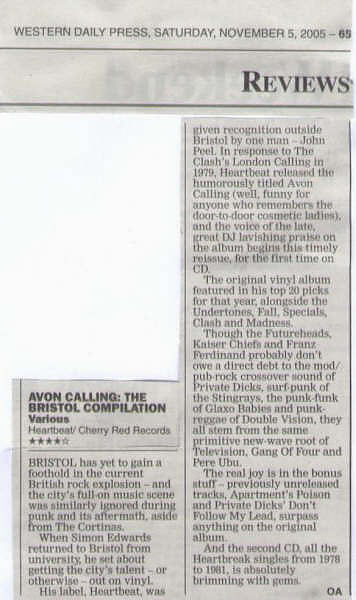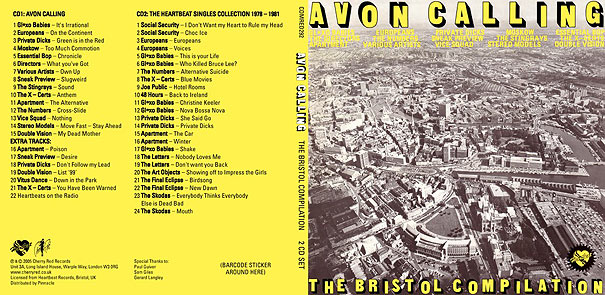Set up in 1978, to provide a platform for music from the Bristol (UK) area to reach a wider audience. Initially run as a partnership between Tony Dodd (Tony's Records, & ace guitar man) and Simon Edwards (local musician & manager), though after the first release Tony decided to concentrate on the shop & Heartbeat became a one man operation. A number of singles & albums were subsequently released around the label flagship "Avon Calling" - The Bristol Compilation LP, which went on to bring Bristol music much deserved critical acclaim & thanks to John Peel a good deal of national airplay.
The story as told in the sleeve notes of AVON CALLING
the re-release 2005.
Interview with Simon Edwards
features music from:
THE SPICS
GLAXO BABIES
THE NUMBERS
COLORTAPES
The punk era has been the subject of much revisionism over the past few years. I'll rephrase that. The punk era has been the subject of a load of complete horseshit over the past few years. Every docudrama set in 1976 has hordes of punks in bondage gear roaming the streets to a soundtrack from the Clash. Well, let me tell you, quite apart from the Clash's first single not coming out until 1977 (clue: the B-side, called '1977'), punk was a very minor part of the cultural landscape through the whole of the late 70's. Gerry Rafferty had his first hit with 'Baker Street' in 1977. His first hit. Of several. Doesn't feature on the soundtracks of the docudramas much, funnily enough, even though it was actually on the radio, unlike the Clash. Punk and new wave were underground, often literally, and virtually all of it was commercially invisible. It meant a lot to us participants,though, 90% of whom seemed to be in some kind of band and were gagging for a review in the NME, let alone a play on the radio.
 Ah yes. Punk and new wave. I've seen a lot of rubbish recently written about that distinction. There seems to be a view that there as punk, which was brilliant, and the punk got diluted to a king of power-pop called 'New Wave'. In the parlance of the times, 'bollocks'. New Wave was the new attitude, against the Eagles and Genisis. Punk was part of the new wave, much of which pre-dated the Sex Pistols. Television weren't punks, Wreckless Eric wasn't a punk, Ian Dury wasn't a punk, Pere Ubu weren't punks, but they, and the Sex Pistols and the Buzzcocks and Blondie and...and...and...were the basis for a whole new kind of record collection. A record collection possessed by most of the players on these CDs.
Ah yes. Punk and new wave. I've seen a lot of rubbish recently written about that distinction. There seems to be a view that there as punk, which was brilliant, and the punk got diluted to a king of power-pop called 'New Wave'. In the parlance of the times, 'bollocks'. New Wave was the new attitude, against the Eagles and Genisis. Punk was part of the new wave, much of which pre-dated the Sex Pistols. Television weren't punks, Wreckless Eric wasn't a punk, Ian Dury wasn't a punk, Pere Ubu weren't punks, but they, and the Sex Pistols and the Buzzcocks and Blondie and...and...and...were the basis for a whole new kind of record collection. A record collection possessed by most of the players on these CDs.
These CDs will give you actual punks (X-certs), reclaimed pubrockers with skinny trousers and ties (Private Dicks), up-tempo attempted popmeisters (Various Artists), arty kids in a strop (Glaxo Babies), New York bohemian wannabes (Apartment), rock-poetic wannabes (Art Objects), teenage dubheads (Double Vison), closet Doors fans with a grudge (Essentail Bop), and many more. Musicians on this scene ended up playing with Massive Attack, Siouxsie & The Banshees, Tears For Fears, Joboxers, whatever. Other musicians on the scene ended up as regulars in the Wetherspoons in Bristol's shotgun district. It hardly matters. Everything sounds quite different now, though at the time the connections seemed logical, even inevitable. None of it is the Eagles or Genisis, after all, though the keyboard player in Essential Bop seems to be harbouring some secret guilty dreams.
I wasn't present at the very birth of the Bristol punk scene, because I was at college in Sheffield being present at the birth of theirs (The Extras residency at The Broadfield pub, in case anyone's asking). But I was back in Bristol for The Cortinas incendiary set at the 1977 Ashton Court Festival, and I subsequently caught pretty much everyone here in their infancies and was indeed caught in my own infancy a year later, by Fried Egg Records, after which Heartbeat claimed my bands notice.
Ah yes, Heartbeat Records. The logo a vinyl record in the shape of a valentine heart. Where did that idea come from? The first Bristol Heartbeat I came across was Amanda Joseph, singer with Blondie-type band the Heartbeats. I saw them at The Stonehouse Pub, it was like Sheffield but more bohemian, less decadent. Less Berlin, more New York.
And then there was Gardez Darkx, whose first single (on New Bristol Records) contained a song called Heartbeat and whose main man. Latif Gardez, is credited as contributing 'unexposed photography' to the second Heartbeat release, the Europeans. I always supposed Simon got the name from one of those sources though I've never asked him about it.
I remember Simon Edwards as being a figure on the scene. Probably around the same age as we were, he seemed older, more together, more business like. I can't remember more than four serious local labels, New Bristol Records, Wavelength, Fried Egg and Heartbeat. Of these, only Simon seemed to be in it for the long haul. Inevitably, Avon Calling would reflect Simon's tastes to some extent. Though he wasn't the first to figure out there may be pounds in putting out what you like, he was the most sussed and therefore this is the most accurate view of what the scene was like.
I think the key to the whole set-up at the time is comprehending the importance of the Glaxo Babies. The Glaxo Babies performance at the 1978 Ashton Court Festival has lived long in many people's memory. The intensity! The died-blond hair! The guitar played with a vibrator! Subsquent journalistic takes have seen The Pop Group placed at the centre that era but I remember it differently. For me, the Glaxos were the cornerstone of the whole Bristol scene. Both sophisticated and primitive, they were basically pre post-punk punk. The Gang Of Four didn't come as the shock of the new round here, mate. I had read the Iggy Pop cut himself with a glass, but it was different seeing Rob Chapman do it immediately in front of you at the Stonehouse pub. They were real, man, and I loved them.
These notes are necessarily a personal set of memories. It wasn't a time for writing things down. It was a time for playing gigs (or at least rehearsing), a time for promoting gigs (or at least sticking up some A4 posters made with a felt tip pen and some Letraset), a time for social and artistic interaction (or at least going to a lot of parties), a time like many other times except it didn't seem like many other times, it really didn't. It didn't seem like any other time at all.
Some of the behind-the-scenes players around these recordings are now very big-wigs indeed, involved in Glastonbury, Womad, Aardman all that stuff. I occasionally run across them and its like the years and our subsequent paths don't mean as much as having been there, then. It was a scene of up-coming young thrusters, old-but-skinny chancers, popkids on the make, art kids on the take, mouthy gits, posh twits, beautiful girls, realistic girls, entrepreneurs, posers, cafes, class A's, political nuts and general fruitcakes. Very entertaining although you could already tell who was being backed for the survival lottery.
It comes down to this. All this music was made for the right reasons. To impress peer groups, girls or boys. Because they wanted to, not because they had to. The most important survivors turned out to be the usual suspects but hey! the art kids on the take and the entrepreneurs. No one else would have kept this shit alive, so enjoy. Enjoy like it's 1980 and there's a whole decade out there waiting to be shaped. You're fucking lucky we thought about you.
Gerard Langley
Check out www.heartbeat-productions.co.uk for the full story.



